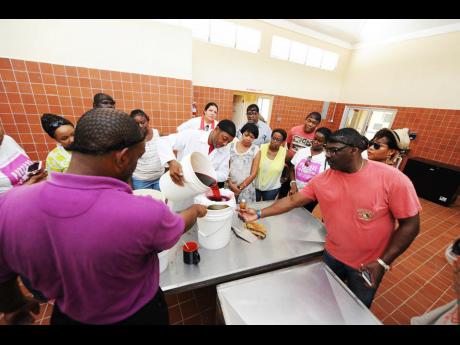Papine High School celebrates ‘firsts’
THERE is a buzz at Papine High School in St Andrew: the school is increasing the number of subjects offered at Caribbean Secondary Education Certificate (CSEC), and it is participating in a range of arts, music and sporting events — all with a view to making the institution a school of choice in the Corporate Area.
Earlier this month, a cohort of 14 students sat CSEC physics, a first for the school. The accomplishment was the culmination of an informal three-year mentorship programme spearheaded by two staff members of the Physics Department at the University of Technology, Jamaica.
One of them, George Ferriera, explained that he was inspired to take on the project when he learned that the school did not offer physics.
“It has been challenging at times for me and my colleague, Hector Simpson,” he said. “However, the students were very interested, and the principal most supportive; therefore, we tried to stick with it.”
Formerly a secondary school, Papine High has been steadily forging its way into uncharted waters and has been including traditional subjects in the school’s curriculum.
“We have always performed well in vocational subjects, and now we are also doing better in other subjects, such as biology and mathematics,” explained Principal Leighton Christie.
The school recorded a 39 per cent increase in its CSEC maths results in 2014.
Educators and students also hope to celebrate another first next month, when the school’s drama club will compete against 14 other high schools across the country in the inaugural JN Shakespeare Schools’ Championship.
The cast of 15 students has been faithfully rehearsing excerpts from Shakespeare’s acclaimed play Hamlet, from which they will present a 30-minute drama adapted to the Jamaican context.
Sponsor Jamaica National Building Society (JNBS) will provide funds for an all-expense paid two-week visit to the United Kingdom for the winning school to participate in the Shakespeare Festival, in Stratford-upon-Avon.
The competition, the brainchild of Jamaican UK resident Dr Tony Sewell, is supported by a team of drama mentors, led by Dr Brian Heap of the Phillip Sherlock Centre, at The University of the West Indies.
Dr Sewell noted: “Most of our students read plays, but never have the opportunity to see them performed; and, in the case of Shakespeare, his plays were meant to be performed to fully appreciate the nuances of the dramatic action.”
“To be the first winner of the competition would be great,” said Melissa Gibson, head of the drama club, who is preparing the Papine High School students for the competition.
“My students are a bit nervous, but they are enthusiastic, and we will show that they have talent, which can emerge to represent Jamaica,” she added.
Principal Christie has also been celebrating his students’ successes in other areas. “We placed first in the School’s Gospel Choir competition this year; and our students have been called on to participate in teams representing Jamaica in cricket, hockey, and squash, as well as track and field,” he outlined with pride.
He is confident that Papine High will continue to excel in many areas, as the teachers are committed to ensuring that students perform well.
“My staff members display keen interest in student welfare and development, and are prepared to go the extra mile. They even provide free extra classes on the weekends and during mid-term,” he explained.
Plans are on-stream to venture into new territories, such as a breakfast programme to start in September, which will be partially funded by proceeds from a recycling project, in which students assist in redeeming plastic bottles for cash.
The project will augment the existing school-feeding programme, which relies heavily on the chicken-rearing and vegetable farming undertaken by students who study agricultural science.
These, according to Christie, are critical elements since some students sometimes arrive at school without having had a meal.
“Like other educational institutions, we do not have enough resources, therefore, we need to be creative and use what we have well,” he maintained, noting further: “My objective is to send increasing numbers of students on to pursue tertiary education and make Papine High one of the schools of choice in the Corporate Area.”
http://www.jamaicaobserver.com/magazines/career/Papine-High-School-celebrates–firsts-_19152773











